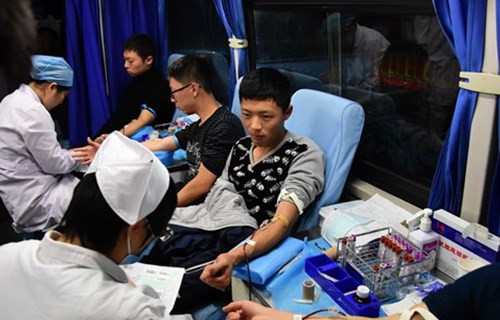导读:如果有一天你的领导告诉你,你的工作和升职都和献血多少有关,你会不会懵了?中国的血液市场究竟有多黑?

Employers and hospitals are coercing people into "donating" blood as the government strives to meet growing demand, workers and patients’ relatives claim.
员工及病人家属称,随着政府努力满足不断增长的需求,雇主和医院强制人们去捐血。
Shen Yishi (pseudonym) told that public institutions in Zhangjiagang, East China’s Jiangsu Province are forcing their employees to "donate" blood by threatening that their annual work evaluation will be negatively affected if they do not comply.
沈一时(匿名)表示位于中国东部江苏省张家港的事业单员工被迫捐血,其领导威胁如果不捐他们的年终工作评审就会受到影响。
This can affect many aspects of their career, including their chances of getting a promotion in future.
这样会从很多方面影响他们的事业发展,包括将来升职的机会。
Shen, a public employee in the city, said that every firm has a blood donation target, which affects their annual evaluation. "Blood donation is a good thing which should be encouraged. But it is weird to make it mandatory."
沈一时是该市的一名公务员,他向记者透露每个机构都有捐血指标,并且会影响到员工的年度评审,献血是一间值得鼓励的好事,但如果变成强制性的就变味了。
An employee of the Zhangjiagang health and family planning commission told thepaper.cn that they have set the targets to make government organs play a leading role in donating blood. "No one has ever expressed any disapproval of the donation target. Every institution has been engaging actively," said the employee.
国家卫生和计划生育委员会的一名员工表示他们已经设定了捐血指标来使国际机关在捐血方面起领头作用,并且没人对这个指标表示过反对,每个机构都积极参与。
Zhou Min, vice chief of the Red Cross Blood Center told thepaper.cn that Zhangjiagang has set blood donation targets for around six years. However, Zhou said that the targets are only assigned to some government institutions and are not technically mandatory.
红十字血液中心副主任周民表示张家港已经设立了6年的血液捐献指标。然而,周表示这个任务只是分配给了某些政府机构而已,严格上讲也不是强制的。
In 2013, the Jiangsu government said 18 percent of an institution’s workers must donate blood if it is to be classed as a "civilized unit," the Xinhua News Agency reported.
据新华社报道,2013年江苏政府表示如果想要被评为文明单位,那这个单位必须有18%以上的员工捐血。
China faced serious "blood crisis" during the beginning of 2016, which according to experts hit 50 out of 70 major cities on the mainland since February, and 80 per cent of operations had to be postponed in some hospitals due to a lack of blood, said the China Newsweek.
据新闻周刊报道2016年之初,中国面临着严峻的“血荒”,且专家表示自2月份以来70个主要城市中有50个城市受其影响,8成医院因缺血不得不推迟很多手术。
Illegal blood dealers can easily be found at government-run donor centers and they pay high rates to secure supplies, the report said, adding that some dealers earn more than 1 million yuan ($145,000) a year.
报告显示很多不法血头藏在于政府经营的捐献中心,他们会花高价格来购买安全血液,并且每年会据此获利约100万元(145000美元)。
The sale of blood is banned and people convicted of dealing blood can face up to five years in jail, according to the law on blood donation.
捐血法命令禁止血液交易,并且进行血液交易的犯罪分子会面临5年以上的监禁。
The blood dealers usually take blood in unhygienic conditions and with few checks on donors’ medical history.
血头通常都是在不卫生的环境下获得血液,并且事先也不会检查捐献者的病史。
Often, disposable syringes are used repeatedly, which increases the risk of infection by blood-borne transmission viruses such as HIV.
通常一次性注射器都会经过反复使用,这样就增加了像艾滋病这种通过血液传播病毒感染的风险。







